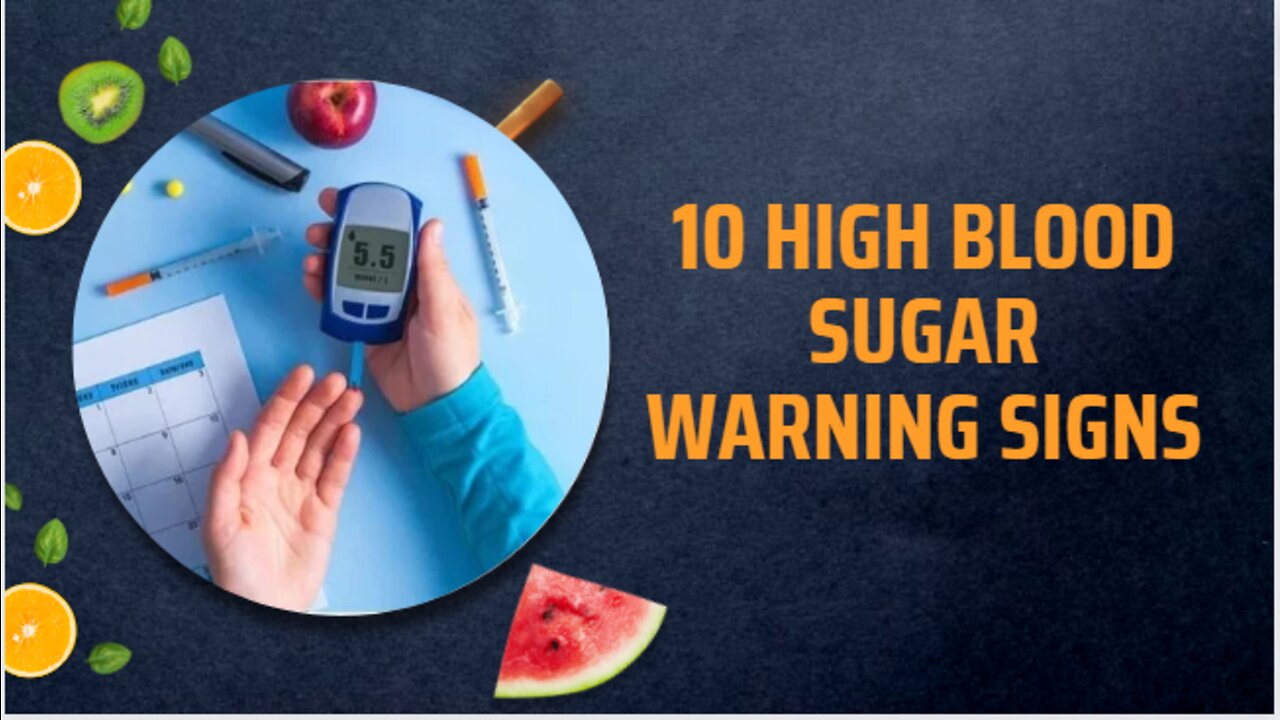Premium Only Content

10 High Blood Sugar Warning Signs
10 High Blood Sugar Warning Signs
https://rebrand.ly/886166
When it comes to maintaining good health, understanding our body's signals is crucial. One important aspect to be aware of is our blood sugar levels. High blood sugar, also known as hyperglycemia, can have serious implications on our well-being if left unmanaged. This article will dive into the ten warning signs that may indicate high blood sugar levels. By recognizing these signals, you can take proactive measures to protect your health and well-being.
Understanding Blood Sugar Levels
What is blood sugar?
Blood sugar, scientifically known as glucose, is the primary source of energy for our body's cells. It is derived from the food we consume, especially carbohydrates. Our body regulates blood sugar levels through the hormone insulin, which helps keep it within a healthy range.
Normal blood sugar range
A normal blood sugar level, when fasting, typically falls between 70 and 99 milligrams per deciliter (mg/dL). After meals, blood sugar levels may rise temporarily but should return to normal within a few hours.
High Blood Sugar Explained
Causes of high blood sugar
Several factors can contribute to high blood sugar levels. These include a lack of physical activity, a diet high in refined carbohydrates and sugary foods, stress, certain medications, and medical conditions like diabetes. Understanding these causes can help you make lifestyle adjustments to manage and prevent high blood sugar levels.
Potential health consequences
Uncontrolled high blood sugar levels can lead to various health complications. These include an increased risk of heart disease, kidney damage, nerve damage, vision problems, and slow wound healing. It is essential to monitor and manage blood sugar levels effectively to minimize these risks.
Warning Sign 1: Frequent Urination
One of the key warning signs of high blood sugar is frequent urination, known as polyuria. When blood sugar levels are elevated, the kidneys work harder to filter and remove excess glucose from the bloodstream. This results in increased urine production, causing more frequent trips to the bathroom.
Warning Sign 2: Increased Thirst
With frequent urination, the body loses more water, leading to dehydration. Consequently, the body signals a heightened sense of thirst to replenish lost fluids. Experiencing an unquenchable thirst even after drinking adequate amounts of water may indicate elevated blood sugar levels.
Warning Sign 3: Fatigue and Weakness
High blood sugar can impact energy levels, resulting in persistent fatigue and weakness. When glucose is unable to enter cells effectively due to insulin resistance or insufficient insulin production, the body's cells do not receive the necessary fuel, leading to feelings of exhaustion.
Warning Sign 4: Unexplained Weight Loss
Unintentional weight loss without significant changes in diet or physical activity can be a cause for concern, potentially indicating high blood sugar levels. In conditions like diabetes, the body may break down fat and muscle tissue for energy due to inadequate insulin action, leading to weight loss.
Warning Sign 5: Excessive Hunger
Experiencing excessive hunger, known as polyphagia, can be linked to high blood sugar levels. When cells are unable to access glucose efficiently, it triggers hunger signals, even if you have recently eaten. This constant hunger can be a sign of insulin resistance or insufficient insulin production.
Warning Sign 6: Blurred Vision
High blood sugar levels can affect the lenses in the eyes, resulting in blurred vision. The excess glucose in the blood can cause fluid to be pulled from body tissues, including the lenses. This changes their shape and ability to focus properly, leading to temporary vision issues.
Warning Sign 7: Slow Wound Healing
If you notice that cuts, bruises, or sores take an unusually long time to heal, it may be indicative of high blood sugar levels. Elevated blood sugar can impair blood circulation and damage nerves, resulting in reduced oxygen and nutrient supply to the affected areas, slowing down the healing process.
Warning Sign 8: Recurring Infections
High blood sugar weakens the immune system, making individuals more susceptible to infections. Common infections that may occur more frequently include urinary tract infections, yeast infections, and skin infections. If you notice a recurring pattern of infections, it is essential to get your blood sugar levels checked.
Warning Sign 9: Tingling or Numbness
Nerve damage, known as neuropathy, is a potential complication of high blood sugar levels. Tingling, numbness, or a "pins and needles" sensation, typically experienced in the hands and feet, could be an indication of nerve damage. It is essential to address these symptoms promptly to prevent further complications.
Warning Sign 10: Dry Mouth and Itchy Skin
Elevated blood sugar levels can lead to dry mouth and increased thirst, causing a lack of saliva production and subsequent dryness in the mouth. Additionally, high blood sugar can result in itchy skin, further aggravated by the loss of moisture. These symptoms may indicate the need to monitor blood sugar levels.
When to Seek Medical Attention
If you experience multiple warning signs of high blood sugar, it is crucial to seek medical attention promptly. A healthcare professional can perform tests to determine your blood sugar levels and provide appropriate guidance and treatment. Early detection and management of high blood sugar are essential for minimizing potential complications and maintaining overall health.
-
 LIVE
LIVE
MYLUNCHBREAK CHANNEL PAGE
1 day agoDams Destroyed Egypt
6,099 watching -
 1:09:53
1:09:53
Game On!
6 hours ago $2.19 earnedThe Masters Day 3 LIVE Reaction!
9.46K -
 23:14
23:14
CatfishedOnline
1 day agoVictim scammed out of $100,000 for 8 years!
8.27K3 -
 17:30
17:30
Bearing
8 hours agoTHIS is why Men Shouldn’t Compete in Women's Sports 🤣
6.4K47 -
 13:19
13:19
VSOGunChannel
1 day ago $1.18 earnedI've Never Cleaned This Gun
10.6K2 -
 16:19
16:19
DeVory Darkins
21 hours ago $10.15 earnedWoke activist dealt HUGE BLOW after judge approves deportation
20.9K94 -
 9:55
9:55
Russell Brand
1 day agoThis Is Absolutely Shocking...
66.6K79 -
 26:01
26:01
The Brett Cooper Show
2 days ago $3.48 earnedChappell Roan Says All Parents Are Miserable. Is She Right? | Episode 21
19.5K26 -
 1:34:25
1:34:25
Michael Franzese
19 hours agoThey Blame Trump for Everything - But Who’s Really Wrecking the Economy?
56.1K61 -
 1:43:55
1:43:55
I_Came_With_Fire_Podcast
14 hours agoThe REVOLUTION to SAVE AMERICA Starts At HOME
45.3K9